Good Morning Blu-ray Movie
HomeGood Morning Blu-ray Movie 
お早よう / Ohayô / + I Was Born, But... and A Straightforward BoyCriterion | 1959 | 94 min | Not rated | May 16, 2017
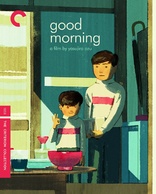
Movie rating
7.9 | / 10 |
Blu-ray rating
| Users | 0.0 | |
| Reviewer | 4.5 | |
| Overall | 4.5 |
Overview
Good Morning (1959)
Two young boys stop speaking in protest after their parents refuse to buy a television set.
Starring: Chishû Ryû, Keiji Sada, Yoshiko Kuga, Kuniko Miyake, Haruko SugimuraDirector: Yasujirô Ozu
| Foreign | Uncertain |
| Drama | Uncertain |
| Comedy | Uncertain |
Specifications
Video
Video codec: MPEG-4 AVC
Video resolution: 1080p
Aspect ratio: 1.37:1
Original aspect ratio: 1.37:1
Audio
Japanese: LPCM Mono (48kHz, 24-bit)
Subtitles
English
Discs
Blu-ray Disc
Single disc (1 BD)
Playback
Region A (locked)
Review
Rating summary
| Movie | 4.5 | |
| Video | 5.0 | |
| Audio | 5.0 | |
| Extras | 4.5 | |
| Overall | 4.5 |
Good Morning Blu-ray Movie Review
Reviewed by Dr. Svet Atanasov April 5, 2017Yasujiro Ozu's "Good Morning" a.k.a. "Ohayo" (1959) arrives on Blu-ray courtesy of Criterion. The supplemental features on the disc include the Japanese master's original silent film "I was Born, but…" (1932) and surviving footage from his early comedy "A Straightforward Boy" (1929); new video essay by critic David Cairns; and new video interview with film scholar David Bordw. The release also arrives with an illustrated leaflet featuring an essay by critic Jonathan Rosenbaum. In Japanese, with optional English subtitles for the main feature. Region-A "locked".
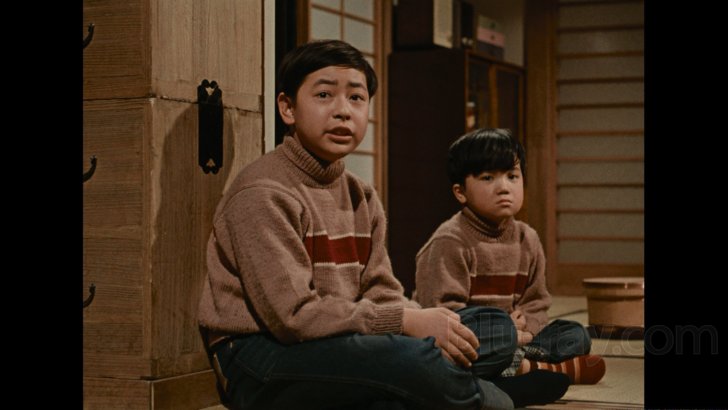
The rebels
*Please note that the silent film I Was Born, but... that is mentioned below is included as a bonus on this upcoming release. It can be accessed via the supplemental features section of the Blu-ray disc.
Japanese director Yasujirô Ozu completed his silent masterpiece I was Born, but… in 1932. The film is set in Tokyo and it is about a young suburban couple and their two sons (Tomio Aoki and Hideo Sugawara) who decide to go on a hunger-strike after their father (Tatsuo Saito) gravely disappoints them with his determination to please his boss.
Good Morning, Ozu’s third color film, is a remake of I was born, but…. The setting is once again suburban Tokyo, but this time around the two brothers (Koji Shitara and Masahiko Shimazu) decide to go on a no-talking strike after their parents refuse to buy them a TV.
The two films share similar observations about generational conflict and Japan’s industrial transformation, but their messages are indeed very different. In I was Born, but… the focus of attention is on the struggle of the two brothers to understand the compromising system of rules and regulations which adults have created for themselves. It is a strange system that contradicts practically all of their perceptions about right and wrong.
In Good Morning there is once again a clash of ideas, but the platform upon which they are introduced is radically different. The adults are given more time to justify their actions, and the entire film has a much more relaxed tone. There is a certain feeling that the adults act as they do because life has simply evolved and they have willingly adapted to it, not because they have been transformed into clowns by an unjust system.
The two brothers in Good Morning are also better manipulators. They go on a no-talking strike but are smart enough to obey their parents when they must, ensuring that their act is perceived as a serious but entertaining game for as long as possible, and winning their sympathy. Obviously, an open confrontation between the two brothers and their parents would have guaranteed a much different result.
Good Morning also links the clash of ideas to Japan’s industrial transformation. Indeed, it is not a coincidence that the two brothers repeatedly address their parents in English and are dreaming about having a TV. Times are changing and for them the TV is already a necessity, while for their parents it is still nothing more than a luxury item.
In I was Born, but… and Good Morning Ozu’s camera remains mostly static, often times observing the main protagonists from afar, as if it is too shy to get close to them. Typically, they come and go, then come and go again.
In Good Morning, the entire neighborhood is also filmed in a similar fashion -- in one scene the perfectly aligned homes look cold, almost devoid of life; in another, when people suddenly appear in front of Ozu’s static camera, they seem warm and friendly. This is middle-class Tokyo suburbia, artificial and sterile, set to boom.
Good Morning Blu-ray Movie, Video Quality 
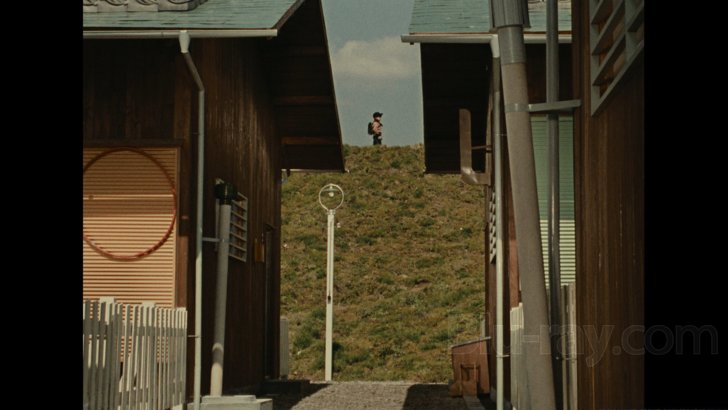
Presented in its original aspect ratio of 1.37:1, encoded with MPEG-4 AVC and granted a 1080p transfer, Yasujirô Ozu's Good Morning arrives on Blu-ray courtesy of Criterion.
Thew following text appears inside the leaflet provided with this Blu-ray release:
"This new 4K digital restoration was undertaken by Shochiku MediaWorX Inc. at Imagica under the supervision of Masashi Chikamori (cinematographer, About Her Brother) from the original 35mm original camera negative. The original monaural soundtrack was remastered from the 35mm original soundtrack negative."
The release is sourced from a brand new 4K restoration of Good Morning which was completed by Shochiku Co. in Japan. Quite predictably, the film now looks a lot healthier and overall significantly fresher. I did some direct comparisons with the previous Region-B release from the British Film Institute that we reviewed back in 2011 and I can confirm that all of the obvious limitations of the older master are completely eliminated on the new master. Specifically, there are no traces of sharpening corrections, and grain is far better exposed and resolved (there isn't even a whiff of the harsh noise that pops up on the old release). Delineation and depth are also vastly superior, with the well-lit indoor footage looking especially strong. Brightness and contrast levels are rebalanced as well. There is a new and finer range of wonderfully saturated primaries and nuances, and the fluttering/pulsations that were present on the old master are fully eliminated. Image stability is terrific.
BONUS FILMS:
I was Born, but...
The film shows signs of aging, including minor scratches, specks, scuffs, and even mild instability during transitions, but the technical presentation is far more convincing than that of the BFI release. Also, here the film runs at its proper speed. It is accompanied by a piano score composed by Donald Sosin in 2008. Music only, with optional English subtitles. (91 min/Dolby Digital 1.0/1080p).
A Straightforward Boy
A note, in Japanese, before the opening credits clarifies the following: "The film is a new restored 35mm print originally from the special 9.5mm sized film. Sections of the film are missing throughout. The beginning and the ending segments have been supplied." While the quality of the surviving elements is far from optimal, the film's overall appearance is good enough to appreciate its creator's intent. With optional English subtitles. (14 min/Dolby Digital1.0/1080p).
(Note: This is a Region-A "locked" Blu-ray release. Therefore, you must have a native Region-A or Region-Free player in order to access its content).
Good Morning Blu-ray Movie, Audio Quality 
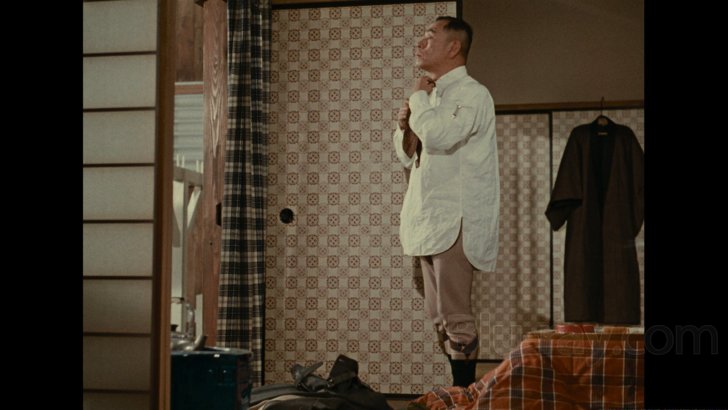
There is only one standard audio track on this Blu-ray release: Japanese LPCM 1.0. Optional English subtitles are provided for the main feature.
The audio has been fully remastered, but I think that most viewers will have a very difficult time noticing a dramatic difference in terms of depth and dynamic strength. Balance and fluidity, however, are improved, though it seems to be obvious enough only during the short music motifs (in the very beginning of the film). The dialog is always stable and easy to follow.
Good Morning Blu-ray Movie, Special Features and Extras 

- I Was Born, but... - presented here is Yasujiro Ozu's 1932 silent film which he later on remade, in color, as Good Morning. For additional comments on the technical presentation of the film, please see the video section of our review.
- A Straightforward Boy - presented here are fourteen surviving minutes from Yasujiro Ozu's 1929 silent comedy. It is the first film in which the Japanese master used children. For additional comments on the technical presentation of the film, please see the video section of our review.
- David Cairns - presented here is a brand new video essay by critic David Cairns that examines the important role humor has in Yasujiro Ozu's films and the manner in which it frequently impacts their rhythm, tone and appearance. With extracts from various films. In English, not subtitled. (18 min, 1080p).
- David Bordwell - in this new video interview, film scholar David Bordwell discusses the key qualities that define Yasujirô Ozu's work, as well as some of the similarities and differences between I Was Born, but... and its remake, Good Morning. The interview was conducted exclusively for Criterion in February 2017. In English, not subtitled. (19 min, 1080p).
- Leaflet - an illustrated leaflet featuring an essay by critic Jonathan Rosenbaum.
Good Morning Blu-ray Movie, Overall Score and Recommendation 
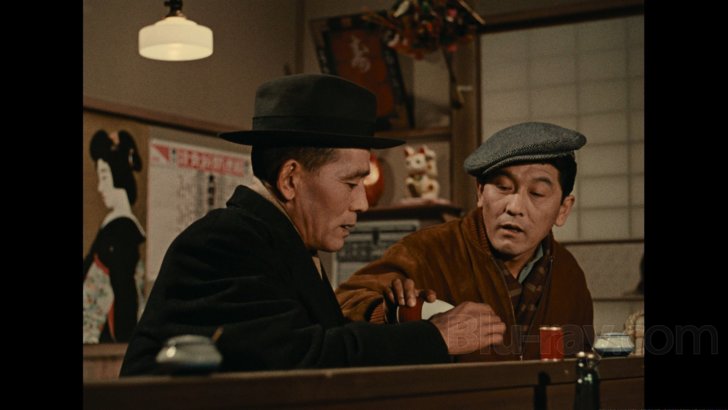
Good Morning is a fascinating film to behold, so simple yet so far-reaching in its observations about modernity. It is also one of Japanese master Yasujiro Ozu's funniest films. It enters the Criterion Collection after an outstanding 4K restoration that was completed by Shochiku Studios in Japan, together with the original silent film that inspired it, I Was Born, but..., featuring a lovely piano score by Donald Sosin. HIGHLY RECOMMENDED.
Similar titles
Similar titles you might also like

Equinox Flower
彼岸花
1958

Late Autumn
秋日和
1960

The Only Son
一人息子
1936

An Autumn Afternoon
秋刀魚の味 / Sanma no aji
1962

Early Summer
麥秋
1951

Late Spring
晩春 | 4K Restoration
1949

Tokyo Twilight
東京暮色
1957

Early Spring
早春
1956

There Was a Father
父ありき
1942

The Flavor of Green Tea over Rice
お茶漬の味 / Ochazuke no aji / includes "What Did the Lady Forget?" (1937)
1952

Tokyo Story
東京物語 / Tôkyô monogatari
1953

I Was Born, But...
大人の見る絵本 生れてはみたけれど
1932

Record of a Tenement Gentleman
長屋紳士録
1947

Floating Weeds
浮草
1959

Still Walking
歩いても 歩いても / Aruitemo aruitemo
2008

Yi Yi
一一
2000

Ikiru
生きる
1952

Like Father, Like Son
2013

I Vitelloni
1953

Drive My Car
ドライブ・マイ・カー / Doraibu mai kâ
2021